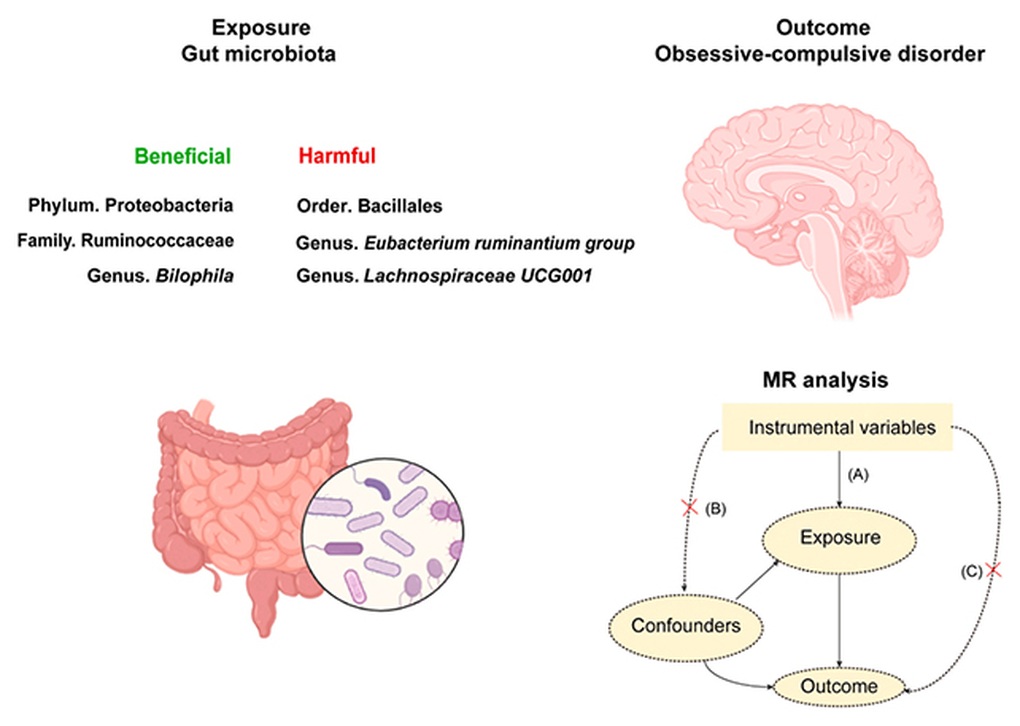Every new discovery about the root causes of OCD is of immense value.
A new study from China suggests that the complex bacterial flora in the digestive tract may influence whether a person develops OCD. The study identified six types of bacteria linked to the condition.

Many previous studies have shown a strong link between brain and gut activity. However, this is the first study to provide convincing evidence that gut bacteria can actually contribute to brain effects. The researchers used genetic data to support this argument.
Scientists at Chongqing Medical University in China said previous studies have not found a causal relationship between gut microbiota activity and OCD.
In a recent report, they write: "Our analysis suggests that specific gut microbiota may have a causal relationship with OCD, suggesting potential intervention strategies for the prevention and treatment of this disorder."

To explore this link, the researchers used a genetic approach called Mendelian randomization analysis. This method allowed them to infer cause by analyzing genetic variations that influence both OCD and gut bacteria.
They assessed the association between genetic data and gut bacteria in 18,340 people, and the association between genetic data and OCD in another 199,169 people.
Although these were two separate datasets, this study used Mendelian randomization to bridge the gap and connect gut bacteria patterns with OCD.
Because our genes are fixed at birth and not influenced by environment or lifestyle, this approach helps strengthen the hypothesis that gut bacteria may directly cause OCD, rather than just be a consequence of it.
However, the research team also noted that more experiments and data are needed to confirm this causal link.
Three bacterial genera that tended to protect against OCD were Proteobacteria, Ruminococcaceae, and Bilophila; and three others that showed increased risk of OCD were Bacillales, Eubacterium, and Lachnospiraceae UCG001.
Interestingly, some of these bacteria have been found to be associated with the brain in other studies, such as a link between low levels of Ruminococcaceae species and depression.
According to scientists, although cognitive behavioral therapy and selective serotonin reuptake inhibitors are used in the treatment of OCD, up to 25–40% of patients do not respond or respond suboptimally to these interventions.
The consequences for individuals with OCD and for those around them are enormous.
By discovering the link between gut bacteria and brain activity related to OCD, we may in the long term find a new way to prevent or treat this disorder by controlling gut bacteria.
Source: https://dantri.com.vn/khoa-hoc/phat-hien-bat-ngo-ve-nguon-goc-cua-chung-ocd-khong-nam-o-nao-20250708022114784.htm



![[Photo] Solemn opening of the 12th Military Party Congress for the 2025-2030 term](https://vphoto.vietnam.vn/thumb/1200x675/vietnam/resource/IMAGE/2025/9/30/2cd383b3130d41a1a4b5ace0d5eb989d)
![[Photo] General Secretary To Lam receives US Ambassador to Vietnam Marc Knapper](https://vphoto.vietnam.vn/thumb/1200x675/vietnam/resource/IMAGE/2025/9/29/c8fd0761aa184da7814aee57d87c49b3)
![[Photo] General Secretary To Lam, Secretary of the Central Military Commission attends the 12th Party Congress of the Army](https://vphoto.vietnam.vn/thumb/1200x675/vietnam/resource/IMAGE/2025/9/30/9b63aaa37ddb472ead84e3870a8ae825)

![[Photo] The 1st Congress of Phu Tho Provincial Party Committee, term 2025-2030](https://vphoto.vietnam.vn/thumb/1200x675/vietnam/resource/IMAGE/2025/9/30/1507da06216649bba8a1ce6251816820)



























![[Photo] General Secretary To Lam attends the ceremony to celebrate the 80th anniversary of the post and telecommunications sector and the 66th anniversary of the science and technology sector.](https://vphoto.vietnam.vn/thumb/1200x675/vietnam/resource/IMAGE/2025/9/29/8e86b39b8fe44121a2b14a031f4cef46)































































Comment (0)